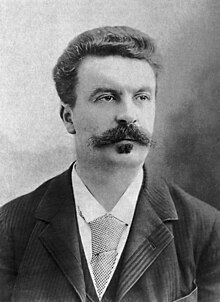De Maupassant
| Guy de Maupassant | |
|---|---|
 |
|
| Born | Henri René Albert Guy de Maupassant 5 August 1850 Tourville-sur-Arques |
| Died | 6 July 1893 (aged 42) Passy, Paris |
| Resting place | Montparnasse Cemetery |
| Pen name | Guy de Valmont, Joseph Prunier |
| Occupation | Novelist, short story writer, poet |
| Nationality | French |
| Genre | Naturalism, Realism |
|
|
|
| Signature |  |
Henri René Albert Guy de Maupassant (/ˈmoʊpəˌsɑːnt/;French: [ɡid(ə) mopasɑ̃]; 5 August 1850 – 6 July 1893) was a French writer, remembered as a master of the short story form, and as a representative of the naturalist school of writers, who depicted human lives and destinies and social forces in disillusioned and often pessimistic terms.
Maupassant was a protégé of Flaubert and his stories are characterized by economy of style and efficient, effortless dénouements (outcomes). Many are set during the Franco-Prussian War of the 1870s, describing the futility of war and the innocent civilians who, caught up in events beyond their control, are permanently changed by their experiences. He wrote some 300 short stories, six novels, three travel books, and one volume of verse. His first published story, "Boule de Suif" ("Ball of Fat", 1880), is often considered his masterpiece.
Henri-René-Albert-Guy de Maupassant was born 5 August 1850 at the Château de Miromesnil (Castle Miromesnil, near Dieppe in the Seine-Inférieure (now Seine-Maritime) department in France. He was the first son of Laure Le Poittevin and Gustave de Maupassant, both from prosperous bourgeois families. His mother urged his father when they married in 1846 to obtain the right to use the particule or form "de Maupassant" instead of "Maupassant" as his family name, in order to indicate noble birth. Gustave discovered a certain Jean-Baptiste Maupassant, conseiller-secrétaire to the King, who was ennobled in 1752. He then obtained from the Tribunal Civil of Rouen by decree dated 9 July 1846 the right to style himself "de Maupassant" instead of "Maupassant" and this was his surname at the birth of his son Guy in 1850.
...
Wikipedia
